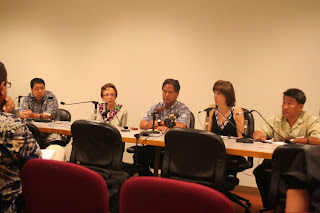Rep.
Blake Oshiro's op-ed on the 2009 legislative session focused on balancing the state budget, without question, the highest priority of the session. This appeared in The Honolulu Advertiser, Sunday, May 17, 2009. Here is a
pie chart that reflects the percentages below.
Modest increases a small part of balancing budgetBy Rep. Blake Oshiro
If there is one message that I would like Hawai'i residents to remember about the 2009 legislative session, it is this: The Legislature balanced the budget, as required by law, mostly through budget cuts, not tax increases. The tax increases that were passed were modest, and will not affect most people in the state.
While the Legislature faced many critical issues this year, balancing the state budget was our first priority.
The budget bill covers state expenditures and revenues over the next biennium, fiscal years 2010 and 2011. Given the Council on Revenues' latest projections, the House and Senate faced a potential shortfall of $2.1 billion by the end of 2011. Our task, therefore, was to find a way to cover that loss through a combination of cutting expenses and raising revenues.
Knowing that tax increases are the last thing politicians want to do, we looked at every option available to us. We considered public employee benefit reductions, eliminating tax credits and tax exemptions, transfers from special funds to the general fund. We turned over every rock, no matter how small, to add to a list of budget solutions.
In the end, here is how we balanced the budget:
Budget cuts and lapses to the general fund accounted for about 50 percent of the solution. The cuts were taken from all departments, but because of the sheer size of some departments, the major cuts came from the agencies with the largest budgets — Education, Human Services and Health.
Applying a carryover balance from fiscal year 2008, and finding various revenues through credit adjustments, non-general funds, penalties and enforcement added another 35 percent to the solution.
Most of the publicity centered on a package of tax increases, which will ultimately account for about 10 percent of the solution to cover the budget shortfall. A tax increase of any kind is difficult to propose. We are well aware that any tax increase, no matter how modest, is going to negatively impact a segment of the population. However, we tried to target the increases on a very small percentage of Hawai'i taxpayers, including high-income earners who make up about 2.4 percent of the population; the hotel room tax; those who are selling property over $2 million and second homes and investment properties of any price; and cigarette and tobacco users.
The federal stimulus money, about $115 million, accounted for about 5 percent of the solution. This was a critical component to our ability to balance the budget, but we also needed to keep in mind that the stimulus is a one-shot injection. Hawai'i cannot expect to receive more federal stimulus money going forward.
In most years, the Legislature passes a budget bill, but also appropriates money through other bills outside the budget. It's significant that this year the Legislature passed only three appropriations from the general fund, the largest of which was $12.3 million for Hawai'i hospitals to treat low-income patients and enable them to receive $12.5 million in matching federal funds for Medicaid reimbursements.
I think it's worth looking at what this budget does not include, for that is an important part of the 2009 legislative story.
We tried hard to ensure that there was minimal impact to the poor and the middle class. The budget does not include a major reduction in services so that our public safety net is dismantled. It does not include mass layoffs, which would only result in skyrocketing unemployment and a serious reduction in consumer spending.
Most importantly, it does not include a rise in the general excise tax, the most regressive tax in terms of impacting those who can least afford it.
Finally, the governor has continuously linked our work in balancing the budget to her ability to negotiate contracts with the public employee unions. She gives the false and irresponsible impression that if the Legislature balances the budget through other means, then it gives the unions little incentive to negotiate a fair contract. The truth is that the Legislature has never used collective bargaining figures to balance the state budget, in good years or bad. It is not our role to get involved or to influence labor union negotiations.
The state budget and the selected tax increase bills have nothing to do with the governor being able to negotiate a fair contract with the unions in the best interests of the state. She should be able to do so without blaming the Legislature and by basing negotiations on the state of the economy and the projections of the Council on Revenues.
In closing, I want to thank the people of Hawai'i for helping us through this very difficult session. Most seem to understand that we had to make tough decisions, but we tried our best to protect the most vulnerable.
 I had a chance to preview Rep. Marilyn Lee's upcoming Kukui Connection shows - the first with Bishop Museum's public affairs director, Donalyn Dela Cruz, and the second with Rep. Hermina Morita, on the top energy and environmental protection bills passed in 2009.
I had a chance to preview Rep. Marilyn Lee's upcoming Kukui Connection shows - the first with Bishop Museum's public affairs director, Donalyn Dela Cruz, and the second with Rep. Hermina Morita, on the top energy and environmental protection bills passed in 2009.







